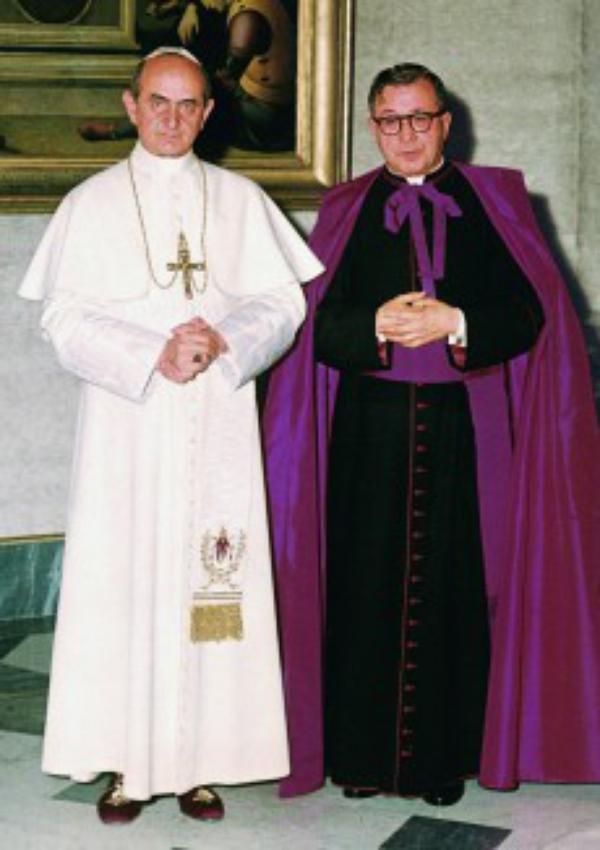No podemos olvidar que nuestra Facultad fue erigida como tal en 1969, durante su Pontificado. Tal reconocimiento a la tarea iniciada unos años antes con el aliento de san Josemaría Escrivá de Balaguer se enmarca en el impulso teológico que san Pablo VI quiso imprimir en la Iglesia en los años que siguieron a la conclusión del Concilio Vaticano II.
En octubre de 1999 tuve ocasión de preparar unas palabras de bienvenida a los participantes en unas Jornadas de Estudio sobre “El hombre moderno a la búsqueda de Dios, según el Magisterio de Pablo VI” que se celebraron en Pamplona. En aquella ocasión quise evocar con agradecimiento el recuerdo de algunos testimonios acerca de Pablo VI que por diversos motivos tienen relación con esta Facultad de Teología, y son por ello particularmente entrañables para quienes trabajamos aquí.
Hoy, veinte años después, pienso que la canonización realizada por el Papa Francisco es un buen motivo para recordarlos de nuevo.
Antes de ser Pablo VI: Juan Bautista Montini
Comencemos por un detalle, meramente anecdótico pero significativo, que hace referencia a las primeras ocasiones en que un profesor de nuestra Facultad fue recibido personalmente por Pablo VI, aunque por la fecha en que tuvieron lugar aquellos encuentros, 1943, el profesor Orlandis —Catedrático de la Universidad de Murcia y joven investigador— todavía no era profesor de esta Facultad, y Juan Bautista Montini aún no era Pablo VI.
Una de las veces en que habían quedado citados, la audiencia anterior se prolongó un poco más de lo habitual y el ujier encargado de introducir las visitas al despacho de Mons. Montini se creyó en el deber de dar conversación a D. José Orlandis para amenizar la espera.
«En la charla surgió, como una confidencia –recuerda el prof. Orlandis–, la opinión que le merecía Montini y la imagen que presentaba ante sus ojos, tan habituado a contemplarle tan de cerca. La definición, dicha en lenguaje popular de un viejo romano me hizo tal gracia –sigue diciendo Orlandis– que nunca pude olvidarla: «Monsignore è proprio un santo: lavora sempre, quasi non dorme e mangia come un uccelletto!».
Esta definición, un tanto singular en su forma, no deja de ser un testimonio expresivo de la capacidad de trabajo y el afecto que Juan Bautista Montini suscitaba en quienes eran testigos de su labor cotidiana.
Años después
Con motivo de otro encuentro, el 21 de enero de 1945, el profesor Orlandis regaló al futuro Pablo VI un ejemplar de Camino, que san Josemaría Escrivá de Balaguer le había hecho llegar a Roma unos días antes. Pues bien, aquel libro no quedaría abandonado en los estantes de una biblioteca, sino que también tendría su historia que hemos podido conocer muchos años más tarde.

Fotografía tomada durante la audiencia de san Josemaría con Pablo VI el 24 de enero de 1964
En una audiencia
Concedida por Pablo VI al Beato Álvaro del Portillo treinta años después, esto es, en 1975, poco después del fallecimiento de san Josemaría, habló a su sucesor al frente del Opus Dei de aquel libro que aún conservaba con esmero.
Así recordaba Mons. del Portillo aquella conversación: «Pablo VI me habló del Padre con admiración y me dijo que estaba convencido de que había sido un santo. Me confirmó que desde muchos años antes leía Camino a diario y que le hacía un gran bien a su alma» (Álvaro del Portillo, Entrevista sobre el Fundador del Opus Dei, p. 18).
El afecto de san Pablo VI por san Josemaría se había manifestado ya desde que tuvo las primeras referencias acerca de su persona y de la labor apostólica que desarrollaba, y quedó plasmado en detalles tan entrañables dentro de su sencillez como el hecho que Mons. Montini pagó de su propio bolsillo los gastos para la concesión del nombramiento de Prelado Doméstico de Su Santidad que el Beato Álvaro del Portillo había solicitado para san Josemaría Escrivá (Álvaro del Portillo, Entrevista sobre el Fundador del Opus Dei, p. 18).
Monseñor Montini y Josemaría Escrivá tuvieron oportunidad de encontrarse por primera vez en 1946 con motivo del primer viaje a Roma del fundador del Opus Dei. San Josemaría recordó toda su vida, y lo manifestó repetidamente, que Mons. Montini fue la primera mano amiga que encontró en su llegada a Roma, y siempre le tuvo un cordial afecto.
24 de enero de 1964
Cuando Josemaría Escrivá fue recibido en audiencia por Pablo VI le causó una honda impresión contemplar en el Santo Padre el rostro amable que había encontrado en los despachos del Vaticano en su primer viaje a Roma.
Así se lo manifiesta con sencillez en la carta que le dirigió unos días después de esa entrevista: «Me parecía estar viendo de nuevo la amable sonrisa, y volviendo a escuchar las benévolas palabras de ánimo –fueron las primeras que escuché en el Vaticano– de S. E. Mons. Montini, en el ya lejano 1946: ¡pero ahora era Pedro quien sonreía, quien hablaba, quien bendecía!» (Carta 14.II.1964. El texto de la misma puede encontrarse en A. de Fuenmayor – V. Gómez Iglesias – J. L. Illanes, El itinerario jurídico del Opus Dei, p. 574).
Son recuerdos sencillos de la historia reciente que testimonian la categoría humana.
Don Francisco Varo Pineda
Director de Investigación de la Universidad de Navarra.
Profesor de Sagrada Escritura de la Facultad de Teología.